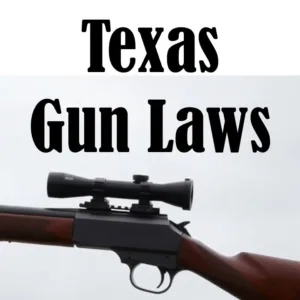Texas is known for its strong support of gun rights, with laws that grant individuals broad freedoms when it comes to owning and carrying firearms. Understanding Texas gun laws is important whether you are a resident or just visiting the state. This guide covers the essential aspects of Texas gun laws, including constitutional carry, concealed carry, firearm purchasing, restricted locations, and other regulations that impact gun ownership.
Texas Gun Laws Overview

Constitutional Carry in Texas
As of September 1, 2021, Texas passed a constitutional carry law (House Bill 1927) that allows individuals who are 21 years of age or older to carry a handgun without a permit, either openly or concealed. This means you do not need a license to carry (LTC) as long as you meet the legal requirements for firearm possession. Texas is among the states that allow permitless carry, making it easier for law-abiding citizens to exercise their Second Amendment rights.
Concealed Carry in Texas
Although Texas allows constitutional carry, many gun owners still choose to obtain a License to Carry (LTC), formerly known as a Concealed Handgun License (CHL), especially for reciprocity when traveling to other states that require a permit for carrying a firearm. The LTC provides legal protections and flexibility, especially in situations where carrying a firearm might otherwise be prohibited.
How to Obtain a Texas LTC:
- Be at least 21 years old (18 if in the military or honorably discharged).
- Complete a state-approved handgun training course.
- Submit your application through the Texas Department of Public Safety (DPS).
- Pass a criminal background check and meet all other eligibility requirements.
- Pay the required fees and wait for the license to be issued.
Once issued, the Texas LTC is valid for five years and can be renewed as long as you continue to meet the eligibility requirements.
Who Can Legally Own a Firearm in Texas?
To legally own or possess a firearm in Texas, you must:
- Be at least 18 years old to possess or purchase a long gun (rifle or shotgun).
- Be at least 21 years old to purchase or possess a handgun (18 for military members or veterans).
- Not have been convicted of a felony or domestic violence.
- Not have been convicted of a Class A or B misdemeanor in the past five years.
- Not be addicted to drugs or alcohol or have a mental illness that makes you a danger to yourself or others.
Purchasing a Firearm in Texas
Texas has relatively lenient laws when it comes to purchasing firearms. There is no requirement for a license or registration to buy a firearm, and there is no waiting period for purchases. However, federal law mandates that all purchases through licensed dealers undergo a background check.
Firearm Purchases in Texas:
- Licensed Dealer Sales: All firearm purchases from a federally licensed firearms dealer (FFL) must go through the FBI’s National Instant Criminal Background Check System (NICS).
- Private Sales: Private firearm sales between individuals in Texas do not require a background check, though it is illegal to sell a firearm to someone you know or reasonably suspect is prohibited from owning one.
Open Carry in Texas
Texas is an open carry state. Individuals who meet the legal requirements to possess a handgun can openly carry a firearm in public without needing an LTC, as long as they are at least 21 years old (or 18 for military personnel). If carrying openly, the handgun must be carried in a shoulder or belt holster. This applies both to handguns and long guns (rifles and shotguns).
Where Can You Carry a Gun in Texas?
While Texas grants broad rights to carry firearms, there are specific locations where carrying a firearm is prohibited, regardless of whether you have an LTC or are carrying under constitutional carry.
- Schools: Firearms are generally prohibited on the premises of K-12 schools and school-sponsored activities, although there are some exceptions for school employees with specific authorization.
- Government Buildings: Carrying firearms in government buildings, including courthouses, polling places, and certain public meetings, is prohibited.
- Private Businesses: Private property owners in Texas can ban firearms on their premises by posting 30.06 or 30.07 signs (30.06 for banning concealed carry, 30.07 for banning open carry). These signs must meet certain requirements to be legally enforceable.
- Bars and Restaurants: Firearms are not allowed in establishments where more than 51% of revenue comes from alcohol sales, and these establishments must post a “51% sign” indicating this restriction.
- Sporting Events: Carrying a firearm at professional sporting events is prohibited, regardless of whether you have an LTC or are carrying under constitutional carry.
Texas’s Stand Your Ground and Castle Doctrine Laws
Texas has robust Stand Your Ground and Castle Doctrine laws, which provide significant protections for individuals who use force in self-defense.
Stand Your Ground
Under Texas’s Stand Your Ground law, individuals are not required to retreat before using deadly force in self-defense, provided they are in a place where they have the right to be and are not engaged in criminal activity. This applies to public spaces, allowing citizens to defend themselves or others when faced with an imminent threat.
Castle Doctrine
Texas’s Castle Doctrine provides the legal right to use deadly force to defend oneself against an intruder in their home, vehicle, or business. The law assumes that anyone who unlawfully enters these premises poses a threat of harm, and individuals have no duty to retreat before using force to defend themselves.
Restrictions on Firearms in Texas
Texas gun laws are permissive, but there are still restrictions regarding certain individuals and types of firearms:
- Convicted Felons: Convicted felons are prohibited from owning or possessing firearms unless their rights have been restored.
- Domestic Violence Offenders: Individuals convicted of domestic violence offenses or subject to a protective order cannot possess firearms.
- Mental Health Conditions: Individuals adjudicated as mentally ill or committed to a mental institution are prohibited from owning firearms.
- Machine Guns and NFA Firearms: Fully automatic weapons, short-barreled rifles, and suppressors are legal in Texas but must comply with federal regulations, including registration with the ATF and obtaining a tax stamp.
Reciprocity with Other States
Texas honors concealed carry permits from all states that issue them, making it a reciprocity-friendly state. Texas residents who obtain an LTC can also benefit from reciprocity agreements when traveling, as many other states recognize Texas’s LTC. However, the laws of the state you are visiting will apply, so it is important to understand those regulations before traveling.
Penalties for Violating Gun Laws in Texas
Violating Texas gun laws can lead to serious penalties, including fines, imprisonment, and the loss of gun rights. Some common violations include:
- Carrying a Firearm in a Prohibited Area: Carrying a gun in locations such as schools or government buildings can lead to criminal charges and fines.
- Possession by a Prohibited Person: Felons, domestic violence offenders, and individuals with restraining orders or mental health issues are prohibited from owning firearms, and violations can lead to felony charges.
- Failure to Follow Private Property Rules: Ignoring posted 30.06 or 30.07 signs banning firearms from private property can result in trespassing charges.
Conclusion: Understanding Texas Gun Laws
Texas is known for its strong support of Second Amendment rights, with constitutional carry allowing most individuals to carry firearms without a permit. However, it is important to understand where firearms are prohibited and the penalties for violating the law.
For those who want additional legal protection or plan to travel to other states, obtaining a Texas LTC can still be beneficial. Familiarizing yourself with both state and federal firearm laws ensures that you can legally exercise your rights while avoiding potential legal pitfalls.
FAQs About Gun Laws in Texas
1. Is open carry legal in Texas?
Yes, open carry is legal in Texas without a permit for individuals who are 21 years old (18 for military members). The firearm must be in a shoulder or belt holster.
2. Do I need a permit to carry a concealed handgun in Texas?
No, as of September 1, 2021, Texas allows permitless carry for concealed handguns. However, you may choose to get an LTC for added protections and reciprocity when traveling.
3. Can I carry a firearm in my vehicle in Texas?
Yes, you can carry a handgun in your vehicle without a permit as long as you are legally allowed to possess a firearm. The firearm can be concealed or openly carried in a holster.
4. Are background checks required for private gun sales in Texas?
No, Texas does not require background checks for private firearm sales between individuals. However, it is illegal to sell a firearm to someone who is prohibited from owning one.
5. What happens if I carry a gun in a prohibited location?
Carrying a firearm in prohibited areas, such as schools or government buildings, can result in criminal charges, fines, and imprisonment.
